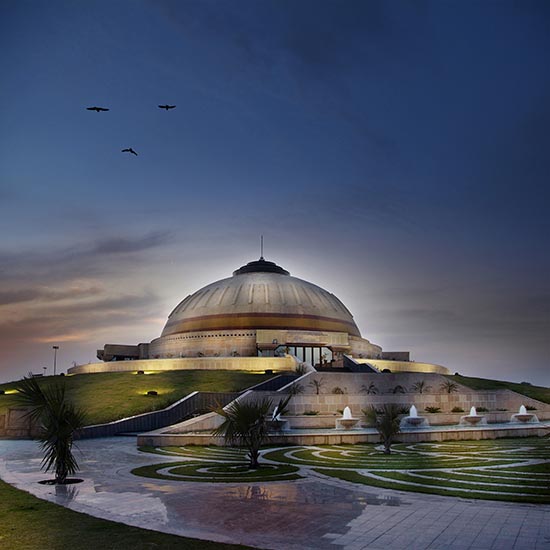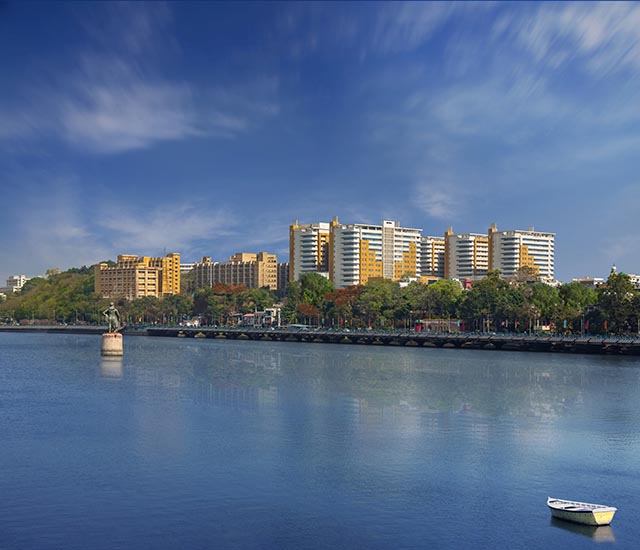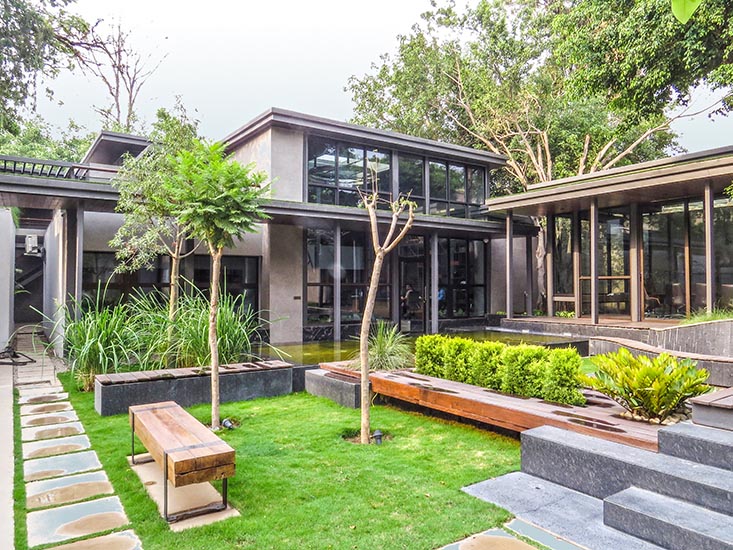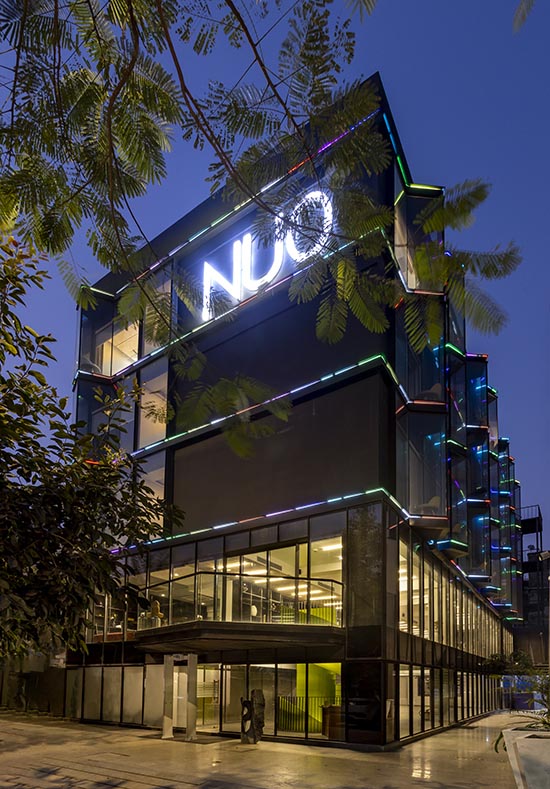
Project Name: Justa Nuo
Location: Greater Kailash-1, New Delhi, India
Typology: Hospitality Client: jüSTa Hotels & Resorts
Architectural Firm: Architecture Discipline, New Delhi
Principal Architect: Ar. Akshat Bhatt Design Team: Akshat Bhatt, Chandni Saxena, Deeksha Gulati
Project Year: Jan. 2022
Site Area: 4360 sq.ft Built-up Area: 10,000 sq.ft
Image Courtesy: Jeetin Sharma
A metropolitan hotel designed to offer a high quality environment to travellers within the heart of the city.

Today, post-pandemic travel demands reliable, sanitised, efficient and comfortable hotels that provide a safe retreat away from home. Nuo, a 27-key urban hospitality project located in Greater Kailash, New Delhi, is the first in a series of small urban hotels by jüSTa Hotels & Resorts that fulfil the specific needs of young, peripatetic professionals in the post-Covid world.

Unlike other urban hospitality projects that are most often housed in superficially adapted existing buildings in the city centre, Nuo is conceived, designed and built from scratch, accommodating the specific requirements of an urban hotel in the most efficient way possible.
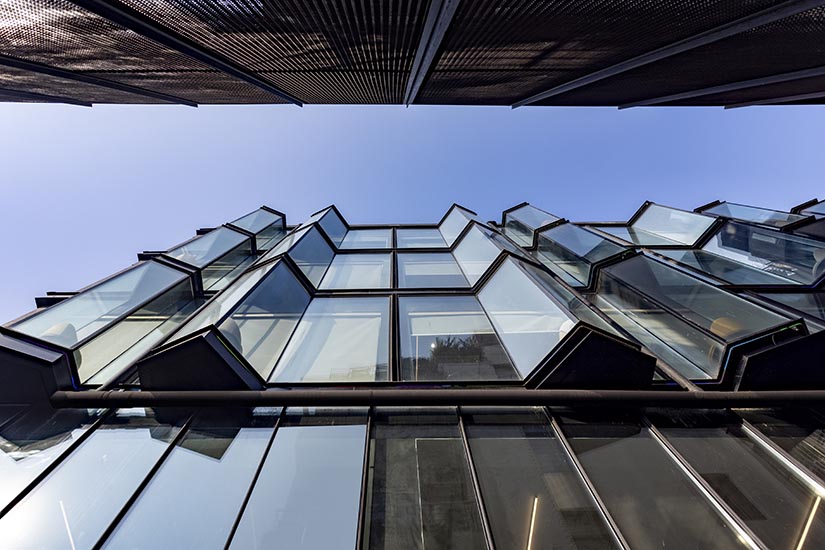
Our design treats the hotel not as an isolated building but as a comprehensive urban intervention. The boundary wall is eliminated, opening the building to the streetscape with a large open-to-sky entrance court. A glazed facade forms an unhindered transition between the outside and the inside, offering a view of a neon green spiral staircase that acts as a beacon, inviting visitors to take notice.
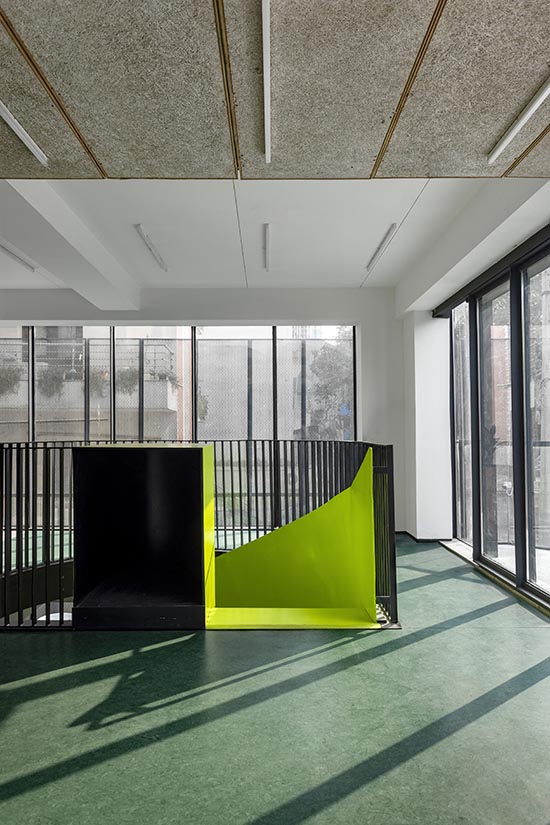
These elements draw passersby in letting them engage visually with the activities within. The entry court directs guests to an external staircase on the southern edge of the site that leads to the ground floor. Guests move through a reception lounge and a café from where they either enter a large atrium that forms the circulation core of the building, or are taken down to the public sphere via the neon green spiral staircase.

The large 15-metre-high, skylit atrium is punctuated by a sinuous black staircase in steel that takes guests to the first, second and third floors, which house individual rooms, and further to the terrace level that accommodates a gym and an open deck. While the upper levels house the private sphere of the hotel, the neon green staircase leads guests down from the entry-level to the lower ground and basement level that form the thriving public sphere.

The lower ground floor houses an art gallery, and the basement accommodates a co-working space equipped with amenities, including conference rooms and a pantry. The interiors of the shared spaces create a universal appeal with neutral tones of black and grey, giving rise to a progressive aesthetic.

Floor finishes in high-performance, locally-sourced floor tech carpets imbibe this theme with a black base and grey linear patterns.

Distinctive, serpentine LED strips run along the ceilings of the corridors and down the stairwell, injecting these spaces with a sense of dynamism. This design sets a recognisable identity that can be easily replicated in upcoming urban hotels by jüSTa Hotels & Resorts at different urban centres.

The monochromatic aesthetic is carried through to the individual rooms but is paired with warm tones of wood introduced in the floorboards and furniture. The rooms strike the right balance between comfort and efficiency, featuring custom-designed furniture with integrated luggage storage and work desks that respond to the needs of the travelling professional.

Locally sourced wood fibre-boards, which can be recycled, are extensively used to attenuate excessive noise of the bustling city outside. A projecting bay window forms a distinctive feature in every room, optimising limited views, bringing in daylight, and acting as a lively burst of space.

The rooms are well-serviced, drawing on the idea that real luxury is all about the quality of air and light.

The private rooms open out onto the large, naturally-lit volume of the atrium creating a dramatic shift in scale. Air conditioning systems maintain air quality and temperature while an integrated heat retrieval unit minimises energy consumption (heat from air extracted is reused to treat conditioned air being supplied).
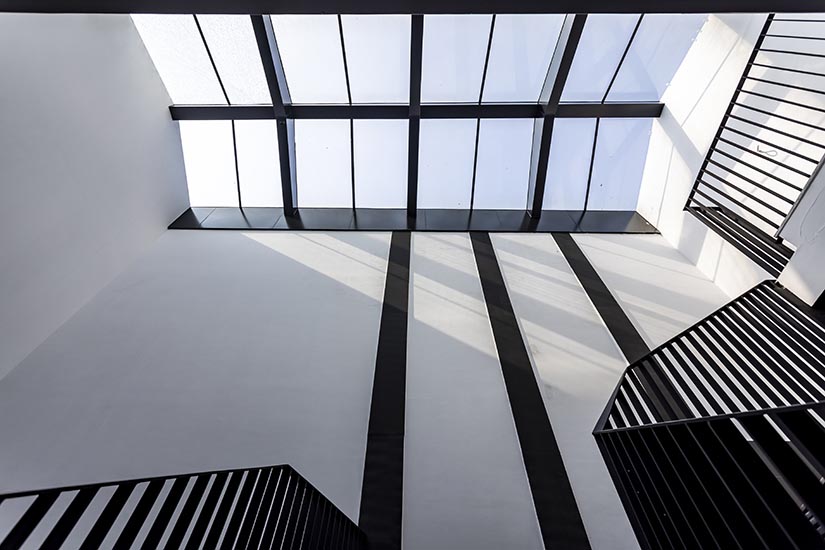
Ample daylighting uplifts the interior spaces and also results in a reduced load on artificial lighting during the day.

The facades of the building are developed in response to the sun path, minimising heat ingress from the south and the west and using glazed projecting bays to capitalise on the light from the northeast. The bays and balconies form striking, rhythmic elements that bring relief to the cuboidal mass of the building, showcasing a play of light, shadow and form and setting it apart from its context.

The street-facing façade presents an interactive interface between the hotel and the city. The lines of the floor slabs are highlighted with strips of coloured LED lights that are coded and operated digitally to communicate indices such as occupancy to onlookers. This forms a striking and playful element on the streetscape at night, drawing people into the public sphere of the hotel that remains active at all times.

The design of Justa Nuo represents a seamless urban connection, carrying the vibrance of the city life into its interior spaces.
About Architecture Discipline founded by Akshat Bhatt in 2007, Architecture Discipline is a New Delhi-based multidisciplinary architecture practice. We aspire to create environments that foster happiness and a sense of optimism for the future, bringing value to people’s lives and work.
Architecture Discipline’s work is driven by a context-centric, rational approach of ideation, which is then defined and developed by a highly technical outlook with a focus on flexibility and longevity.
Our portfolio spans varied typologies from interior projects, residences and workspaces, to retail and hospitality projects, to large-scale urban and commercial assignments. Notable projects include the multi award-winning Mana hotel in Ranakpur, Rajasthan (2013); the Discovery Centre, a town hall for the Bhartiya City township in Bengaluru (2014), the India Pavilion at the Hannover Messe in Germany (2015) which was adjudged the best pavilion in the 65-year history of the Messe, and the Corporate Headquarters for East India Hotels, the flagship company of The Oberoi Group, in Gurugram (2019). Other significant work includes retail environments for Forest Essentials and Perona; workspaces for Rug Republic, Delhivery, and Motherland Joint Ventures; hospitality and F&B spaces for The Leela Palaces, Hotels and Resorts, The Postcard Hotels and Resorts; and new brand developments for The Oberoi Group in New Delhi, Agra, and Kolkata, where we are working on the refurbishment of the 19th-century edifice of The Oberoi Grand.

